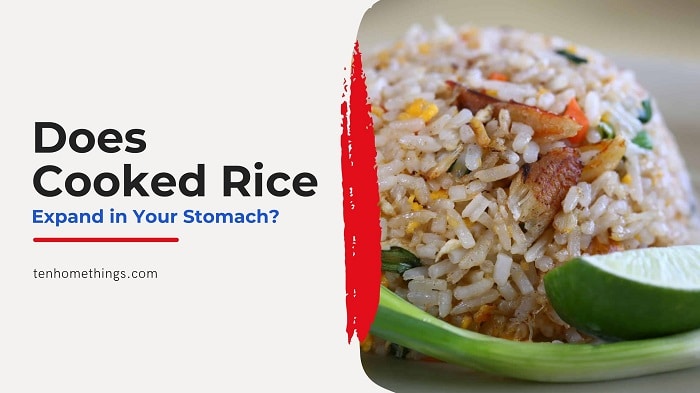Have you ever wondered, “does rice expand in your stomach?”, or what about “does cooked rice expand in your stomach?”? If you have, we have the answers to some of your most commonly asked questions when it comes to rice expansion.
If rice is often one of the main ingredients in lots of your meals, you might be interested to find out more about the science of rice. Does rice expand or multiply, what happens during the cooking of rice, and then what happens when it hits your stomach?
Discover the answers today, and enjoy your meals even more.
Table Of Contents:
Does cooked rice expand in your stomach?

No, rice doesn’t expand in the stomach. That’s the short answer.
The reason for this is that when you bring rice to the boil in hot water, that’s when it expands. So, when you eat the cooked rice, it’s grains of rice have already been boiled and expanded. Why does it expand? Rice expands during the boiling process because it’s absorbing all the water.
When you boil rice, it’s actually a chemical change that takes place because you can’t reverse it once it’s been boiled. It starts in the form of hard grains, and then it’s nice and soft afterward.
Whereas, boiling a liquid like water would be a physical change, not a chemical one. That’s because when you finish boiling it, it stays the same.
back to menu ↑
Does under cooked rice expand in the stomach?
Undercooked rice is definitely not good for you, that’s for sure. Some say that undercooked rice will expand in your stomach because it uses liquids to do the expansion. But the major health concern is that eating undercooked rice can have extremely bad effects.
Why can undercooked rice be harmful?
Undercooked rice can be dangerous to someone’s health because it can have a type of bacteria called Bacillus Cereus in it. If you don’t cook the rice thoroughly and properly, you risk not killing all of that bacteria. If you don’t get rid of it all, and then you consume it, that bacteria ends up in your stomach.
back to menu ↑
How to avoid rice expansion in your stomach?
If you’re worried about getting bacteria in your stomach from undercooked rice, the best course of action to take is to ensure you properly cook it. Always follow these steps to do that.
How to properly boil a portion of rice
1. Wash it
Put your rice in a bowl and cover it with fresh, cold water. You might prefer to just run the cold tap though. Use a fork to move it around, ensuring that the cold water is getting to all of the grains.
It can be much easier to sieve your rice with a running cold tap if you’re short on time or want to get straight to the cooking part. If you do have the time, you can leave the rice in cold water to absorb the water for half an hour because it encourages the grains to be cooked evenly. But you don’t have to. Just ensure you’ve properly washed the rice.
2. Heat it
Heat your rice in a pan with two times the amount of water. So, if you’re heating up 70g, add 140ml. Don’t skimp out here because you might be surprised how quickly and how much the rice will absorb all of that water. Plus, you don’t want it to burn.
Remember, you’re not trying to fry the rice, so avoid high heat. You want to properly, steadily cook all of it through and through. So a low heat is your best option to safely cook rice. Bring it to a boil and then stir with a wooden spoon. One stir will do, no more.
3. Simmer, and keep covered for the perfect tenderness
Once boiled, let your rice bubble away for about 9 minutes. But the trick is to ensure it stays covered. Don’t be tempted to remove your pan lid in these 9 minutes. This part is not only cooking it properly, but it’s also making it the perfect moistness. If it’s done right, it works every time to get juicy but not dribbling cooked rice.
4. Ensure it’s cooked
How do you make sure your rice is thoroughly cooked, after your hard work? You can judge by checking the water levels. You should find that the water has almost completely evaporated and been soaked up. But if there is still a fair amount of water left, it’s not likely not cooked. Give it more time.
5. Serve, or wait for the last water droplets to be absorbed
Serve up your rice in a bowl or plate now if you like. Alternatively, if you’d like to, or you have the extra time, you can always pop it in a bowl or plate, and then drape a cloth over it for 5-8 minutes. Those last bits of water will be mopped up then.
You don’t have to cook rice by boiling it though. There are other ways. You can heat it on the stove or the microwave. But the stove can take over half an hour. That can be too much if you’re tight on time on a weeknight.
back to menu ↑
Does rice expand or multiply?
Rice does expand when it cooks. But how much bigger does it actually get when it absorbs the water?
You need to know so that when you’re preparing your ingredients, you get the servings right. It multiplies its own size several times. It doesn’t mean multiplying as in adding new grains to itself. The grains just get bigger when they suck up the water.
Read on to find out more details about how much bigger different types of grains get.
back to menu ↑
How much does rice expand while cooking?
Some types of rice can expand up to 3 or even 4 times from their original size. But this can change depending on the type of rice you are cooking. That’s why so many of us end up having leftovers because it’s so easy to forget that rice expands when you cook it!
Let’s take a look at the table below to see how much each type of rice grain expands by. These are the most common ones anyway.
Type of rice How many times it expands by itself:
| Type of rice | How many times it expands by itself |
| White | Three |
| Brown | Two |
| Jasmine | Three |
| Wild | Three to four |
back to menu ↑
Conclusion
Now, you can feel empowered to cook rice the right way, so there is no risk to you experiencing any stomach problems when you eat your delicious meal. When you know how to cook an ingredient correctly, it feels good!
Rice can be cooked in multiple ways, and you can mix it up to make so many different dishes. It’s such a versatile ingredient. One popular way is to pair it with herbs and chicken!
Why not use your new found inspiration to cook some yummy meals? Two of our favorites are the Chicken Wings and Spicy Chicken Bites. You can always add a side dish of rice too, and now you can cook rice in confidence.
Alternatively, you can learn how to cook rice on an induction cooktop.
back to menu ↑
Frequently Asked Questions
Do rice cakes expand in your stomach?
No, eating rice cakes won’t make your stomach expand. Most rice cakes are made with just rice, so they don’t have any gluten in them. So they won’t make you feel really bloated or cause any bad indigestion.
back to menu ↑
Does more water make rice expand?
Yes. Rice cooks drawing in all the water. Different grains of rice need different amounts of water to cook properly because the grains will expand at different rates. For example, brown rice and white rice will need different quantities. Brown rice doesn’t absorb as much, so doesn’t need as much liquid to cook. Whereas, white rice requires an awful lot more.
back to menu ↑
Does quinoa expand like rice?
Quinoa can be a great rice alternative. But it does also get bigger when you cook it. You can boil it the same as you do with a pan of rice, and it will grow up to 3 times. You’ll likely find it that much more tasty though.
Lots of people often choose quinoa rather than rice-based dishes because it can be the healthier option. There are some claims that quinoa is better if you want to lose weight. This is thought to be because there is much more fiber in quinoa than in rice.
But rice is still a perfectly good, healthy ingredient to cook with! Add some meat (or a vegetarian alternative like Quorn), and throw in some vegetables and you’ve got yourself a perfectly balanced meal.
back to menu ↑
Can rice cause bloating, and why?
Yes, rice can cause bloating. Despite the fact that rice is certainly a low sugar ingredient, lots of people do suffer from bloating and it can be due to rice consumption. It’s important to remember that not all bloating is caused by rice though.
But if you’re someone who struggles with any gastro-related issues, it could be worth considering if rice is the cause. We’d recommend speaking to your doctor about that though.
Rice is technically a part of the low FODMAP family. So, what’s FODMAP? It’s a group of foods that can typically cause lots of stomach cramping, gas, and general tummy upset. Some people who suffer from these symptoms can choose to live on a diet where they avoid high FODMAP foods because they can irritate your gut.
back to menu ↑
Can rice cause weight gain?
Yes, rice can cause you to gain some weight if you consume seriously high quantities of it. That’s because it’s a rich carbohydrate. But lots of other foods are like these. If you decide to eat very high amounts of bread on a regular basis for a long time, this can lead to some weight gain.
A balanced diet including rice is your best bet if you want stress-free eating, with lots of enjoyment and happy taste buds.
If you’re passionate about having the best health or maybe you’ve been advised by a doctor to change your diet, you could consider opting for brown rice instead. It’s got even less sugar in and has lots of really important nutrients too.
back to menu ↑
Can rice give you food poisoning?
It can, but only if it’s cooked properly. If you follow these clear steps in our article and ensure you cook your ingredients thoroughly, you’re far less likely to see any illness, we’re sure.
If you don’t bring it to the boil completely, or you don’t give it a really good wash, you are then at risk of potentially getting food poisoning. You might feel experience vomiting and sickness or tummy cramping. Do get in contact with your doctor for medical advice
Shanny
Shanny not only has an exceptional understanding of the foodie mindset and how nutrition works, she has also achieved her Master’s Degree in Education. Outside of her academic achievements, she loves writing food blogs. It's so much more than a list of meals though! Shanny creates helpful cookware guides and delicious recipes that are easy to follow. She does all of this as a food blog writer because she loves it. That's why she spends lots of time testing out different recipes in her own home. She truly is a one-of-a-kind foodie, from her home to yours - with a story to tell, new recipes to indulge in and new tips to tantalize those tastebuds.












